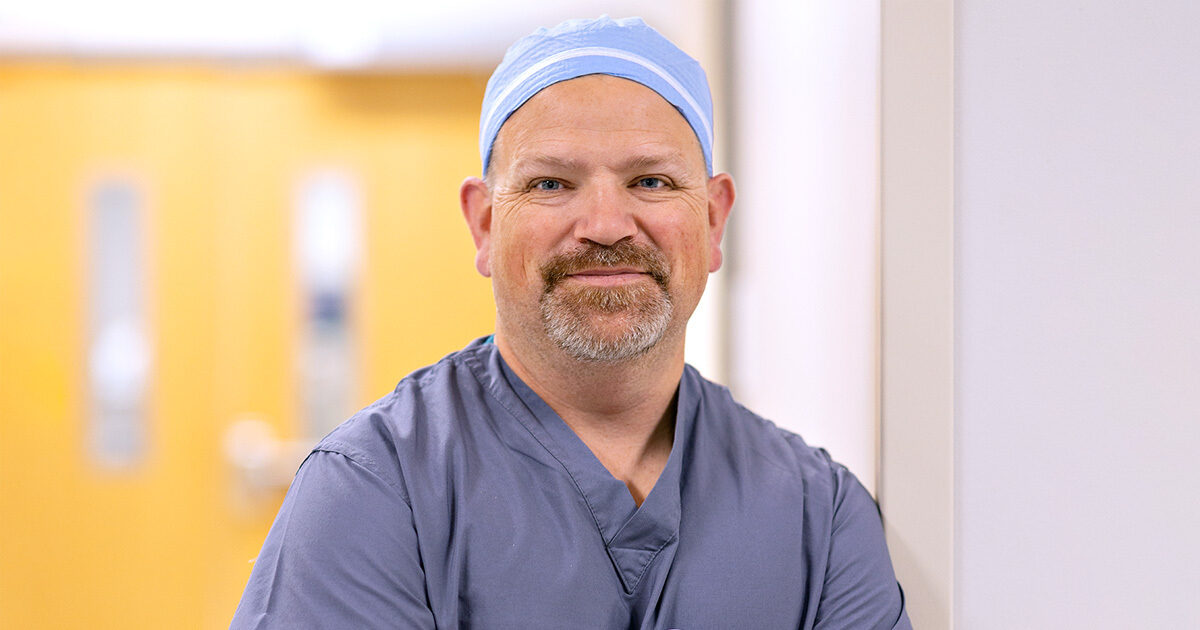Going the Distance
Patient travels across the globe to receive care through the Musculoskeletal Institute
Reviewed by: Andjelka Delic, Aleksandar Kavcic, Petar Golijanin, MD, and Karl Koenig, MD
Written by: Lauren Schneider

Andjelka Delic, a resident of Serbia, began to experience pain in her hip during the early days of the COVID-19 pandemic. As the pain persisted, walking up and down the stairs in her home became increasingly challenging.
After unsuccessful attempts to manage her pain with medication, Andjelka enlisted her son, Aleksandar Kavcic, a local Austin resident, to help her search for providers in the United States who could perform a total hip replacement. She was referred to Karl Koenig, MD, a board-certified orthopedic surgeon and the Executive Director of UT Health Austin’s Musculoskeletal Institute, who specializes in hip and knee replacement surgery.
“There were somewhat unusual logistical considerations in Andjelka’s case, such as her travel situation,” shares Dr. Keonig. “But our team of experts are excellent at coming together to coordinate
care around a patient’s specific circumstances to make sure they receive the care they need.”
Meeting a Patient’s Unique Needs
The Musculoskeletal Institute care team worked with Andjelka and Aleksandar to schedule an appointment while Aleksandar was in Serbia visiting his mother. “Given that my mother’s procedure was scheduled overseas, the process was amazingly efficient,” notes Aleksandar. In August 2021, the mother-son duo travelled from Serbia to Aleksandar’s home in Austin in preparation for Andjelka’s surgery the following month.
“When a patient comes to see us, we truly have everything they need in one place,” explains Dr. Koenig. “We do everything we can to prevent complications, which may include a preoperative lab work-up, preparing the home environment, and ensuring that the patient is in the best physical condition for surgery through ‘prehabilitation,’ or what we call ‘prehab.’”
Learn more about how prehab can optimize surgical outcomes.
<br>“The entire process leading up to, during, and after my surgery was fantastic and happened very quickly,” shares Andjelka. “Just two hours after my surgery, I was able to walk.” In the days following the procedure, Andjelka received regular phone calls from her care team.
“I can’t start my day until I know that the patients I’ve operated on are doing well,” says Dr. Koenig. “So, we start our day with what we refer to as ‘rounding on the patients.’ We call and check in on all our patients to make sure they’re feeling okay and that their pain is controlled. Whether or not they are in the clinic, we take a tremendous responsibility for all our patients.”
Two weeks after her surgery, Andjelka was cleared to begin physical therapy, which occurred three times a week. Dr. Koenig referred her to a physical therapist near Aleksandar’s home so that the two would not have to commute downtown. Two months after her surgery, Andjelka was cleared to return home to Serbia for the remaining three weeks of her recovery.
A Surprising Connection
At the start of her care journey, Andjelka faced a language barrier. In addition to support from Aleksandar, Andjelka was able to access a video translation system through the Musculoskeletal Institute that provides translation for more than 150 languages.
When Andjelka returned to Austin in September 2022 for her one-year follow-up visit, she and Aleksandar were greeted in their native language by Petar Golijanin, MD, a second-year trainee in the Orthopedic Surgery Residency program at Dell Medical School who was born in Serbia.
“Greeting Andjelka and Aleksandar in our shared language allowed us to connect on a personal level,” shares Dr. Golijanin. Many of my peers in my residency program are also multilingual and can speak Spanish, French, Arabic, Portuguese, and Hindi as well as other languages. I joke that if the translation system were to break down, we could still communicate with many of our patients who would otherwise use that service.”
Communication is also a priority for Dr. Koenig. “When connecting with patients, there are some things that get lost in translation,” says Dr. Koenig. “A lot of my patients speak Spanish, so I’ve taken it upon myself to take Spanish lessons to not only be able to communicate with my patients, but also to try to understand where they’re coming from.”
Andjelka, Aleksandar, and Dr. Golijanin shared personal stories and even discussed Andjelka’s case in Serbian at the appointment. “It was a very nice bonding experience,” says Dr. Golanjin, who has since stayed in touch with Andjelka and Aleksandar from across the world.
In addition to marking the start of new friendships, the follow-up appointment allowed Andjelka to update her care team on how far she has come since her total hip replacement. “I am walking freely and without pain,” says Andjelka. “I feel amazing.”
For more information about the Musculoskeletal Institute or to schedule an appointment, call 1-833-UT-CARES (1-833-882-2737) or visit here.